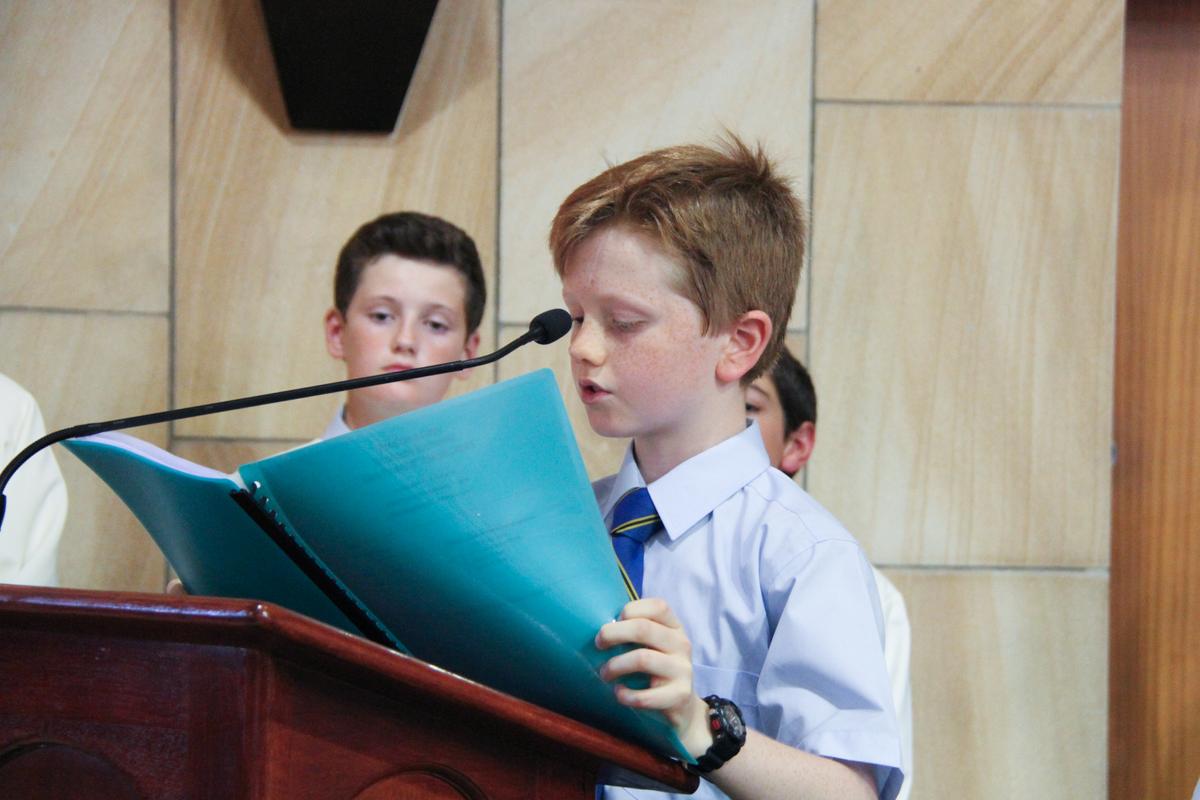Principal

Year 5 Parent-Student Mass and Welcome Dinner: Friday 8 March 2024
Thank you to our Year 5 parents/carers and students who made the trek back to school last Friday night, in humid and muggy conditions, for our welcome mass and dinner. It was a massive turnout, with just under 500 people to officially kick off these boys’ eight-year journey at SPC.
Welcoming new students to a school is not just a formality; it plays a crucial role in creating a positive and supportive learning environment. Here are some reasons why it is essential that we invest time and energy in welcoming a new cohort:
1. Social and Emotional Wellbeing: Transitioning to a new school can be daunting for students. A warm welcome helps them feel accepted, valued, and less anxious. When students feel emotionally supported, they are more likely to engage in learning and build positive relationships with peers and teachers.
2. Academic Success: A smooth transition positively impacts academic performance. When students feel connected and comfortable, they are better equipped to focus on their studies. Conversely, a stressful transition may lead to falling behind academically or even skipping school.
3. Building Community: Welcoming activities foster a sense of belonging. Students who feel part of a community are more likely to participate in extracurricular activities, collaborate with classmates, and contribute positively to the school environment.
4. Teacher-Student Relationships: Teachers play a vital role in welcoming new students. Their support and encouragement can make a significant difference. As we know as educators, teachers often become the most important person in a student's life.
5. Long-Term Impact: A positive welcome sets the tone for a student's entire school experience. It influences their attitude toward learning, their motivation, and their overall wellbeing.
Investing time and energy in welcoming new students isn't just about logistics; it's about creating a nurturing environment where everyone feels valued and ready to learn. The Welcome Mass is the most beautiful way to gather our school community in Year 5, both new and returning parents, to celebrate the start of the academic year and their son/s eight-year journey to the HSC in 2031.
The night isn’t possible without our wonderful community leaders who organised the event: Mr Sinadinos, Mr Cooper, Ms Daley, Ms Osorio Narvaez, Ms Grape, Fr Jack, our Year 5 classroom teachers, Primary School leaders – Mr Fields, Mrs Tatola and Mr Locke. Of course, the dinner was masterfully organised by Elena Ierardo and our P&F Executive. It is my hope that many parents/carers in the Gym that night were inspired to join and assist our P&F so that our wonderful, welcoming practices are passed on to the next generation of parents.
“Each student, a chapter waiting to unfold,
Inscribed with dreams, courage, and stories untold.
Teachers turn pages, igniting sparks,
Guiding young minds through life's labyrinthine arcs.”
Drowned in Sound: How Listening to Music Hinders Learning
It constantly amazes me how quickly boys find and use their headphones as soon as the bell rings at 3:10 PM! Unchecked, the boys would wear them constantly, sending the implicit message that normal human interactions are not welcomed.
Aside from all that, boys will try to convince you that listening to music helps you study. Parents ask me all the time – “Is this true?”. What does research tell us? There is one fascinating study that I turn to for direction. Researchers from the applied psychology department of Cardiff Metropolitan University led a study to answer this question. The authors, Nick Perham and Harriet Currie, assigned students into one of four groups: the first revised in silence, the second revised while listening to music with lyrics they liked (which included songs from One Direction and Katy Perry), the third group revised to music with lyrics they did not like (which comprised of very heavy metal bands), and the fourth group revised listening to music without lyrics.
The participants then took a test on the passages they had been revising, rating how distracting their environment had been and writing down their predictions for how well they thought they had done.
What were the main findings?
- Students who revised in quiet environments performed more than 60% better in an exam than their peers who revised while listening to music that had lyrics.
- Students who revised while listening to music without lyrics did better than those who had revised to music with lyrics.
- It made no difference if students revised listening to songs they liked or disliked. Both led to a reduction in their test performance.
- Students who revised in silence rated their environment as less distracting and accurately predicted that this would lead to better performances in subsequent tests.
There are some benefits to listening to music while performing certain tasks. It can be quite motivating, and it can improve mood (listening to your favourite song tends to make people smile, for example). However, it does not help people learn new or complex material.
The misconception that music does help us learn stems from a series of studies linked to the “Mozart effect.” These studies found that people performed better on a series of cognitive tasks after listening to 10 minutes of Mozart. Participants in these studies appeared to be getting smarter and performing better in tests.
However, further research has since revealed this is not the case. While listening to music before a task can make someone feel better, listening to it while trying to learn something new tends not to help. This is because music – especially tunes with lyrics – can take up processing space. This conflicts with the material you are trying to learn, effectively creating a bottleneck in your memory, as there is less space to process what you are revising.
What does this mean for the classroom and at home in their study areas?
It is important that students are made aware of the pitfalls of listening to music when revising. Perham and Currie’s study found that students rated the quiet environment as less distracting and better for them, yet many students continued to listen to music during their homework. Why? Perhaps they’re doing so out of habit, or they confuse what improves their mood with what leads to good revision, or it alleviates boredom. Perhaps it’s simply because everyone else is doing it. In our focus on changing Atomic Habits, let this be one small habit to try to break. Try for one hour then build up until ALL your study time is conducted in a noise-free and headphone-free environment.
Students need to know how to revise well. There may well be a time and place to listen to music during revision, but not when they are learning new and complex material.
After all, silence is golden.
(The Guardian, March 2018, Lessons from Research)
Keep in your Prayers
Please keep the family of Jacqueline and Paolo Lombardo (Alessandro (Year 12), Sebastian (Year 11), Cristian (Year 9) and Gianluca (Year 6)) in your thoughts and prayers after losing their home in a house fire yesterday. Thankfully, no one was home, and the family cat was rescued; however, it was a terrible shock and loss for them. We have been in touch and offered our support, both materially and emotionally, and when we are made aware of what they need, we will let our community know.
Dr Vittoria Lavorato
Principal
SPC boys can do anything!
**except divide by zero












